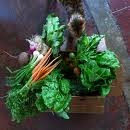It stands for Community Supported Agriculture.
So, what does that mean?
Over the last 20 years, Community Supported Agriculture (CSA) has become a popular way for consumers to buy local, seasonal food directly from a farmer. In a nutshell -
A farmer offers a certain number of "shares" to the public. Typically the share consists of a box of vegetables, but other farm products may be included.
Interested consumers purchase a share (aka a "membership" or a "subscription") and in return receive a box (bag, basket) of seasonal produce each week throughout the farming season.
This arrangement creates several rewards for both the farmer and the consumer.
For farmers:
They spend their time marketing their food early in the year, before their 16 hour days in the field begin
They are paid for their food early in the season, when the share is "purchased" which helps with the farm's cash flow
The have an opportunity to get to know the people who eat the food they grow
For the consumers:
Each week when the food is in season, they get a box of ultra-fresh food, with all the flavor and vitamin benefits
They may be introduced to new vegetables and new ways of cooking
Farmers usually like consumers to visit the farm at least once a season
Kids tare more inclined to favor food from "their" farm – even veggies they've never been known to eat
They develop a relationship with the farm family who grows their food and learn more about how food is grown
They soon realize that the issues farmers deal with impact them too and become advocates for agricultural issues
This simple idea has a profound impact on the tens of thousands of families who have joined CSAs.
Looking to find a CSA in your area?
The best and most comprehensive directory of CSA farms can be found on LocalHarvest.com which lists over 2,500 CSA farms in their directory.
has the most comprehensive directory of . CSA farms, with over 2,500 listed in our grassroots database.
From the LocalHarvest web site:
As you might expect with such a successful model, farmers have begun to introduce variations. One increasingly common one is the "mix and match," or "market-style" CSA. Here, rather than making up a standard box of vegetables for every member each week, the members load their own boxes with some degree of personal choice. The farmer lays out baskets of the week's vegetables. Some farmers encourage members to take a prescribed amount of what's available, leaving behind just what their families do not care for. Some CSA farmers then donate this extra produce to a food bank. In other CSAs, the members have wider choice to fill their box with whatever appeals to them, within certain limitations. (e.g. "Just one basket of strawberries per family, please.")CSAs aren't confined to produce. Some farmers include the option for shareholders to buy shares of eggs, homemade bread, meat, cheese, fruit, flowers or other farm products along with their veggies. Sometimes several farmers will offer their products together, to offer the widest variety to their members. For example, a produce farmer might create a partnership with a neighbor to deliver chickens to the CSA drop off point, so that the CSA members can purchase farm-fresh chickens when they come to get their CSA baskets. Other farmers are creating standalone CSAs for meat, flowers, eggs, and preserved farm products. In some parts of the country, non-farming third parties are setting up CSA-like businesses, where they act as middle men and sell boxes of local (and sometimes non-local) food for their members.
Please visit the LocalHarvest web site - they have a wealth of information and tips for people interested in participating in a CSA.


0 comments:
Post a Comment